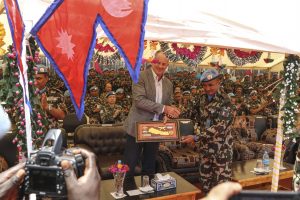Amid growing challenges to strike a balance between India, China and the U.S., Nepal is drafting a new foreign policy which is expected to reflect the changed domestic and international environment.
A taskforce formed by Nepal’s foreign ministry has already finalized a new document which is likely to be endorsed by the cabinet soon, but it is still unclear whether the document will be made public. The task force prepared the new policy over the past year by seeking inputs from seminars and discussions.
In an interview Foreign Minister Pradeep Gyawali said that his ministry was preparing an integrated document on Nepal’s foreign policy incorporating elements such as national security policy, economic assistance policy and others typically scattered across policy documents.
Gyawali further added, “The new document we are preparing will reflect domestic political changes as well as fast changing geopolitical environment. Our constitution adopted in 2015 has provided clear directives on what are our national interest and on the basis of guidance of constitution we are preparing an integrated document.”
Nepal is formulating a new foreign policy strategy at a time when it is struggling to reconcile the growing and competing interests of big powers in Nepal. Sandwiched between two Asian giants, India and China, striking a balance between two countries has been the core challenge of Nepal’s foreign policy over the past six decades. Lately, growing conflict between India and China has posed additional challenges to Nepal’s foreign office.
Regarding Nepal’s foreign policy toward both countries, Gyawali said: “Our geopolitical location is an opportunity for us. The new foreign policy aims to transform our geopolitical location into an opportunity.” According to him, diversification of Nepal’s foreign and trade policy is another component of the new policy.
The Nepali Constitution, adopted in 2015, provides guidelines for the country’s foreign policy. Article 5 of Nepal’s 2015 constitution says: “Safeguarding of the freedom, sovereignty, territorial integrity, nationality, independence and dignity of Nepal, the rights of the Nepalese people, border security, economic wellbeing and prosperity shall be the basic elements of the national interest of Nepal.”
Likewise, says the constitution’s directive principles notes: “The State shall direct its international relations towards enhancing the dignity of the nation in the world community by maintaining international relations on the basis of sovereign equality, while safeguarding the freedom, sovereignty, territorial integrity, and independence and national interest of Nepal.”
The constitution further states “the Charter of the United Nations, non-alignment, principles of Panchasheel, international law and the norms of world peace, taking into consideration of the overall interest of the nation, while remaining active in safeguarding the sovereignty, territorial integrity, independence and national interest of Nepal.”
Unlike previous national charters, the 2015 constitution envisions reviewing past bilateral treaties and agreements based on equality and mutual interest.
Along with border issues with India, there are other sticking points in Kathmandu’s relations with New Delhi. For instance, Nepal is pushing for the amendment of 1950 Peace and Friendship Treaty, which is the bedrock of bilateral relations with India. An Eminent Persons Group (EPG) was formed in 2016 toward that goal. Even though the EPC prepared its report in 2018, India is unwilling to consider and implement it.
Very recently, there has been minor improvement in relations between two countries but it is not enough.
Both sides are looking for a thaw in relations. However, chances of border talks between two countries are still slim. Instead, both India and Nepal are seeking confidence building measures to move ahead in the relationship.
Although the current government led by Nepal Communist Party (NCP) Chairman KP Sharma Oli is facing criticism for tilting toward China, in fact there has not been much progress on the key issues in relations with that country either.
For instance, it has been more than three years since Nepal signed the framework of the Belt and Road Initiative (BRI) but it is yet to select specific projects under the BRI.
The two countries are yet to arrive at a consensus on the funding modality of projects that Nepal would implement under the BRI. Similarly, agreements reached between the two countries during Chinese President Xi Jinping’s visit last October remain unimplemented. However, in the last four years, there have been several strategic agreements between the two countries and China’s investment in Nepal is growing. Similarly, China’s political influence in Nepal has increased in the recent years.
With the United States, a $500 million grant under the Millennium Challenge Corporation (MCC) Compacts program has been pending for two years due to a conflict inside the ruling NCP.
Recently, a ruling party taskforce suggested the government accept the grant only after the amendment of some clauses in the proposed agreement. But it is still not sure the U.S. will agree to amend these provisions.
To date, the U.S. claims it is ready to offer clarifications in event of ambiguities. There are two schools of thought inside the ruling party when it comes to the MCC Compacts program; some party leaders are of the view that U.S. assistance should be accepted after some changes, while other leaders are totally against it.
Growing competition among major powers when it comes to Nepal may also contribute to foreign policy indecision.
The past practice of foreign policy and the constitution has provided a framework for Nepal’s foreign policy but in reality all governments, past and present, have faced tough challenges. The Oli government is trying to offer a new perspective which may help resolve Nepal’s foreign policy dilemmas. However, whether the new foreign policy guidelines offer a fresh view on how Nepal should handle China, India, and the United States – especially given India-China and U.S.-China strategic rivalry – remains to be seen.
Nepal does have a history of maintaining neutrality in great power conflict; that does not mean, however, that it would be immune to its effects.

































